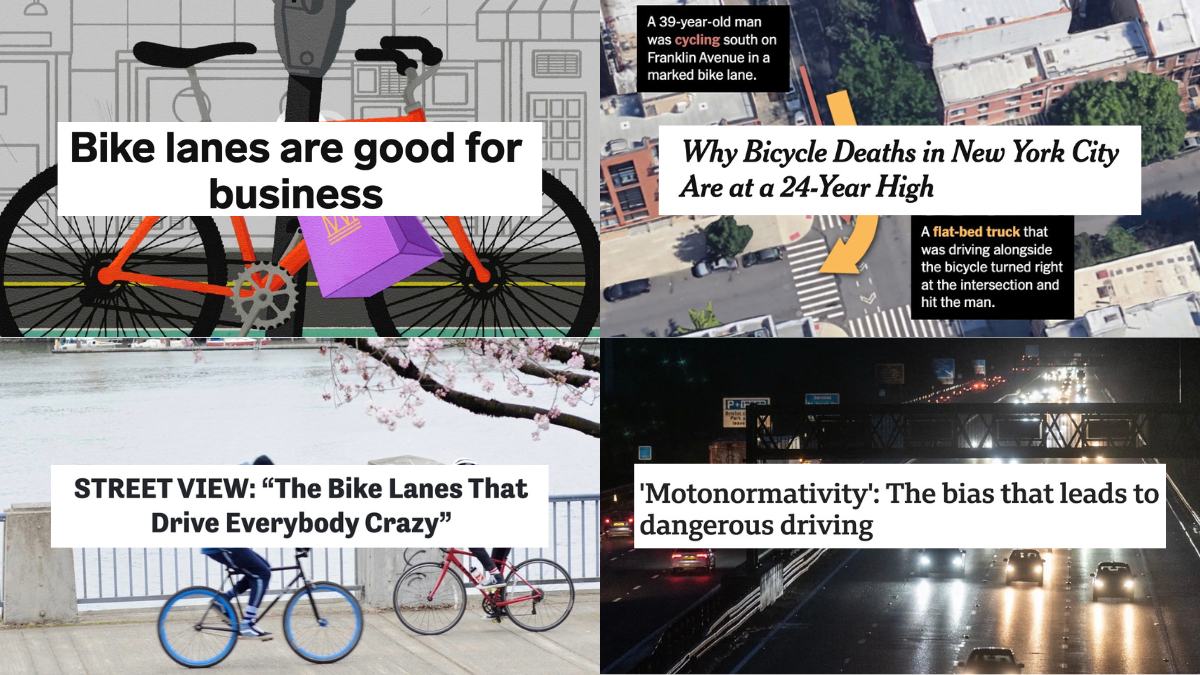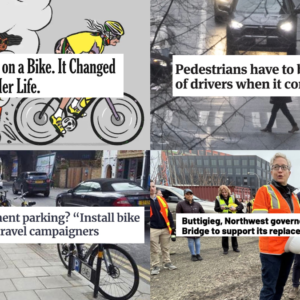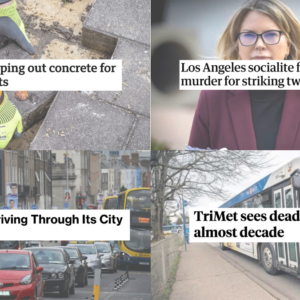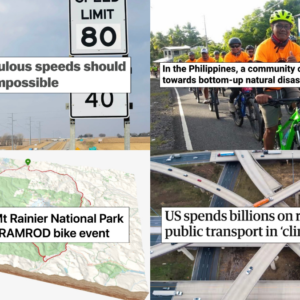Welcome to the week. It’s going to be a great! Let’s get started.
Here’s what our community has been talking about for the past seven days…
This week’s roundup is sponsored by the Worst Day of the Year Ride, Portland’s iconic costumed ride that celebrates its 20th year on Sunday, March 24th!
Bikes mean business: The reader who sent this article to me said, “I thought you might want to share this article with Mingus Mapps.” It’s a summary of 40 years of research (including one study from Portland State University) that should prove once and for all that bike lanes are actually good for business. (Business Insider)
Psychology of driving: If you want to have something to chew on when it comes to the urgent need to change road safety culture, do yourself a favor and read this excellent breakdown of “motonormativity.” (BBC)
An American in Paris: Two U.S. riders stood on the podium of the major spring classic race, Paris-Nice on Sunday. And a rider with Idaho roots, Matteo Jorgenson, earned the win. (Associated Press)
Seattle doubles down: The Washington legislature passed a comprehensive traffic camera bill that is a very clear sign that they believe automated enforcement of traffic laws is the future. (The Urbanist)
Magnet man: A do-gooder in Atlanta has taken to the streets with high-powered magnets installed under a bike trailer and has collected hundreds of points of crap from traffic lanes. Who’s going to make one of these for Portland? (WABE)
Travesty of justice: The judge in this story is responding like an objective, reasonable person to the idea that killing someone with your car while intoxicated could result in a relative slap on the wrist. (SF Chronicle)
E-bike rider deaths: An analysis of bicycling fatalities in New York City has some intriguing takeaways — including a surprising number of deaths that befell people who didn’t come into contact with any other person or vehicle. (NY Times)
London gets it: The city of London quadrupled the size of its bike network since 2016 under the leadership of just one mayor. (Global Cycling Network)
Meanwhile, in Portland: Former BikePortland writer Taylor Griggs penned an op-ed in here new “Street View” column that details the abysmal leadership on bicycling in Portland city hall. (Portland Mercury)
Thanks to everyone who sent in links this week. The Monday Roundup is a community effort, so please feel free to send us any great stories you come across.








Thanks for reading.
BikePortland has served this community with independent community journalism since 2005. We rely on subscriptions from readers like you to survive. Your financial support is vital in keeping this valuable resource alive and well.
Please subscribe today to strengthen and expand our work.
Not to dis your sponsor, but seriously… they moved the Worst Day of the Year Ride to March because the weather was too bad on the previous date. They really should rename it “The Possibly Overcast Day in March Ride”.
Yet another example of shrinkflation.
My feeling is that this ride has transcended its name. It was a fun rallying point back in the day, but now it’s just an excuse to get together with friends and dress up and go on a bike ride. The weather thing is kind of an afterthought at this point.
Motornormativity:
I feel both of these frequently when walking, especially if I’m in a crowded area and people are blocking my path or if a train or drawbridge is blocking my way. I also experience them on my bike when I’m on a crowded path like the Springwater or Esplanade and I have to go slow or brake a lot.
And yes, many drivers are overconfident; it’s one of the many ways our brains fool us and make humans ill suited for the job of driver. Better roads can help, but only so much.
But I’ve been told that e-bikes aren’t dangerous.
Yeah, well I bet you’ve also been told across the years or decades that cycling in general is dangerous. I certainly have. But I know cycling is not inherently more dangerous than other way of getting around, just as an ebike under me won’t inherently lead to more injuries or death for me. The machine, or no use of a machine, is just one of many factors. Those incapable of safely wielding ebikes should not wield them, just as most drivers should recognize they’re probably average skilled at driving, but that doesn’t mean we need to blanket discourage ebike use, which is one effect of knee-jerk focus on their danger.
Those who simply say ebikes aren’t dangerous are dense, disingenuous, and/or unskilled at complex elucidation. They’re best ignored or dealt much patience to help them clarify their position.
It’s probably the case that e-bikers are overconfident in their skills just as drivers are.
It’s not a driving issue, it’s a human brain issue.
I agree that many are. People like Chris I seem to overlook that, is one reason why I made my comment.
All bikes are dangerous to some degree. Ebike just aren’t as dangerous as regular bikes. If you adjust for rider experience and share of rider miles in NY ebikes vs regular bike deaths are pretty favorable.
The data from NYC indicates otherwise. E-bike riders are getting injured and killed at a higher rate than the average cyclist.
IME as a shop owner, I’d guess the higher rate of ebike riders injured comes more from newb riders than from the bikes having motors. The pandemic of 2020 brought me many customers who haven’t ridden in years or decades, but their numbers pale in comparison to customers (mostly in retirement age) who have come to me in the last two years looking to ride an ebike after not having ridden any bike since teenage or earlier years.
Ebikes are seriously addictive. I was using mine even for short trips to the grocery and neighborhood rides. I stopped using mid-drive non-throttle for health reasons – I get about 40% more exercise on a regular non-ebike. Yeah, sure, I could have cut the power and it rides like a beach cruiser on sand (on any paved street), but why would I? I’m simply better-off healthwise, long-term, on using my normal bikes.
So, the TL:DR is that of 30 cyclists who died on their bikes in New York last year, 23 were on E-bikes and 7 were on normal bikes. Of the 23 E-bikes, 7 were single-vehicle crashes (crash, not accident, right?) And of the 7 normal bikes, there were zero single-vehicle crashes. This is NOT actually surprising to me, or to my friend the ER nurse who reports an influx of injured E-bikers.
I wonder how many of the crashes were from brake failure? Brake fluid leaking, cheap e-bikes with mechanical brakes, I’ve even seen cheap e-bikes with Huffy-grade BMX side-pulls.
Aloha Taylor! I will have to restart reading PMercury. 😉
To build on the core of her message AND to create strategy for the election season… let “us” now introduce ourselves as “avid drivers” [as most cyclists in the new Portland drive too]…and then recommend that the CoP / PBoT get on it and build more AND better bikeways…so that cyclists have a safer AND more logical place to operate as ‘a vehicle’. This has worked very well in other cities and countries I have cycled, driven and studied.
And if necessary one can add an emotional plea that these make the roads safer and less stressful for driver to share with cyclists where cyclists are often given only ‘half a measure’ and one the starts and stops every block or old land use parcel.
London Gets It: Good news! The City of London 4xed their bike lane mileage, and got a 20% increase in riders. If we did the same (by building 1200 more miles of bikeways), and got the same results, we should expect to make up half of the ground we lost between 2019 and 2022.
Let’s get on it, PBOT!
https://bikeportland.org/2023/03/15/city-counts-reveal-data-behind-portlands-precipitous-drop-in-cycling-371407
https://www.portland.gov/transportation/walking-biking-transit-safety/biking-portland
Yes, let’s. Not because 20% more bike riders would be any sort of landmark achievement, but because prioritizing cycling (along with walking and transit) is a social good. Public spaces should be safe and welcoming for everyone, not just people in cars.